Time of their life
The Diplomat interviews companies
with a milestone to celebrate
HERE FOR THE LONGTERM
Siemens: 100 years
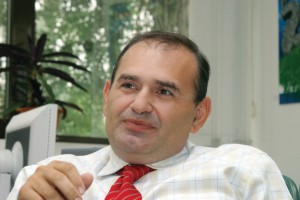 Then and now
Then and now
Century-old technology giant Siemens first established a factory in Romania in 1905. Since then the Austrian-German company has diversified into fields such as energy, telecommunications, medical equipment and transport. In 2000 it became a single company in Romania. “If back then the plan seemed pretty simple, to grow the businesses and develop in Romania, today we can say we have certainly achieved this,” general manager Adrian Baicusi tells The Diplomat. In 2000 the company employed 45 people and posted a turnover of 30 million Euro. This year Siemens Romania employs 2,500 people in 13 companies nationwide and enjoys a turnover of 280 million Euro.
Greatest achievement
In transport, the delivery of 'Blue Arrow' intercity trains and some completely automated rail stations, says Baicusi. In energy, the firm is proud of running projects for substations in Oradea and Bucharest - Sud and, in telecom, its delivery of UMTS equipment for Connex.
Greatest challenge
Besides investing extensively in training Romanian specialists to meet the company's requirements, Baicusi says the biggest challenge was moving as many projects as possible towards being run directly in and from Romania, using local competencies.
Savings bank CEC: 141 years
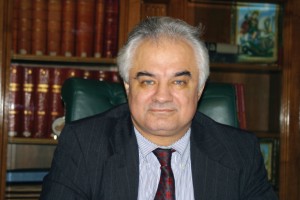 Then and now
Then and now
The first bank in Romania, created 16 years before the National Bank of Romania, CEC has and always will be a retail bank. It survived Communism, where it had a pretty big competitive advantage and, in the 1970s, was the only bank offering credits to the population. “I had a credit with CEC to buy my house,” says Eugen Radulescu, CEO at CEC. “Which I only paid off three years ago.” Its head office on Calea Victoriei is now a museum. The building has a foundation stone laid by King Carol I of Romania and the bank's 1,400 network is due to be sold off to one of seven international financial institutions soon.
Greatest achievement
Resistance. “Even when the times were transforming, CEC transcended wars and changing regimes. Everything else dies in front of this achievement,” says Radulescu.
Greatest challenge
“Today's transformation,” Radulescu adds. “CEC was quite a passive savings bank and we have made it into a modern and efficient credit institution.”
Romexpo: 35 years
Then and now
Every year Romexpo organises over 40 fairs in fields such as construction, defence industry, medicine and tourism. George Cojocaru, president of Romexpo, tells The Diplomat that Romexpo differs from its competitors by focusing mainly on creating “a fertile business opportunities environment,” while other fairs tend to be more interested in image.
Greatest achievement
“To become a window through which potential partners and foreign investors can have a clear overview of the Romanian economy,” says Cojocaru.
Greatest challenge
After Communism, to increase the number of fairs and give them an updated and modern look, says Cojocaru.
Arctic: 35 years
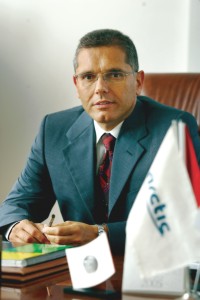 Then and now
Then and now
Arctic is one of the few local brands which have managed to maintain its name over the regime change in 1989. Since then it has succeeded in gaining a leading position in the white goods market, a sector dominated by strong international brands. Established as a state firm in 1970, Arctic was bought by Turkish group Arcelik in 2002, which helped boost refrigerator manufacture. Production capacity has increased from 350,000 units in 2000 to an estimated 750,000 this year.
Greatest achievement
Arctic's extension of the brand on the domestic market, says Ugur Kayali, the company's general manager. Arctic is the leader on the local white goods market, with a 30 per cent market share.
Greatest challenge
“The most challenging part was to manage such an aggressive growth and, at the same time, to integrate Arctic within Arcelik's systems,” says Kayali.
15 YEARS
Rubin Meyer Doru & Trandafir (RMDT)
Then and now
Active in all areas of company law, the game has just started for Rubin Meyer Doru & Trandafir (RMDT), the only firm in this country affiliated to Israel's largest law firm, Herzfeld and Rubin, says managing partner Andy Raftopol. “We intend to participate in the transformation of the legal profession in Romania from a passive, indirect player in the world of business, to one fully happy with being in the middle of the deal,” he says. The company has increased its staff by 50 per cent this year.
Greatest achievement
RMDT's involvement in the sale of Romtelecom, BCR, CEC and Electrica Muntenia Sud.
Greatest challenge
“Our greatest struggle was during 1998 to 2000, when much of Romania's legislation was in a period of flux, with frequently conflicting laws clashing with differing interpretations, often applied retroactively and in an ambiguous and inconsistent manner by the courts and the authorities,” says Raftopol. But he says it “pays” to have a good sense of humour when dealing with Romanian law. “Thankfully, the situation is much more sober these days.”
Softwin
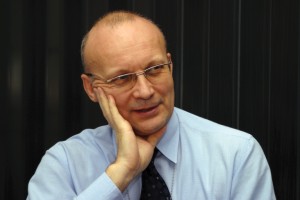 Then and now
Then and now
Set up as a family business by Florin Talpes and his wife Mariuca in 1990, Softwin provides one of Europe's leading anti-virus software, BitDefender, and employs over 800 people in countries such as Germany, USA and Romania.
Greatest achievement
“Going international successfully,” says Talpes. The company has almost 50 employees who are not Romanian. “This includes Germans in Germany and British people in the UK. This is multinational and multicultural. Also building an extraordinary team. This is the strong basis for our future success.”
Greatest challenge
“This is connected to going international,” says Talpes. In the centrally-planned Communist economy, Talpes says the education system was “designed following needs of that system” and did not produce business skills. “That had an impact. Changing this culture has been the firm's biggest challenge.”
RTC Holding
Then and now
Toys, pens, TVs, cars, erasers, shampoo and chewing gum were all sold by Octavian Radu when he set up RTC 15 years ago with 7,000 Deutschmarks. Since then he focused on the best performing businesses and today, RTC Holding gathers 65 companies, including book and stationery shop Diverta, record company Zone Records, video rental store Hollywood Music & Film and wine shop Vices and More, with an expected turnover of 200 million Euro turnover for this year.
Greatest achievement
"I am very proud of Diverta store in Plaza Romania," says Radu. “But when I see the returns I am sad,” he adds.
Greatest challenge
“Diverta was a bet against all odds,” says the president. “The 1990s many bookstores were closing in Romania, so I took the chance to build one up. In Romania, book consumption is low compared to the West and even to Russia, but even so, it has seen an increasing trend. Two years ago Diverta was about to be shut down. But this year book sales increased by 70 per cent compared to 2004.”
Concept Electronics
Then and now
IT and data security solutions provider Concept Electronics started out as Aris Electronics and last year posted a turnover of 3.5 million Euro. President Dan Dragoiu tells The Diplomat the next step will be expanding to neighbouring countries by the middle of 2006. Will they sell out? Dragoiu says that the company is “open to any opportunity, but a merger is not yet a priority.”
Greatest achievement
Partnerships with first rank and international information technology companies and being accepted as a choice for some firms' IT and communications solutions.
Greatest challenge
To become a respected name on the market and a difficulty is finding the right people to help the company grow, says Dragoiu. Re-branding from Aris Electronics to Concept Electronics in 2002 was a challenge. But at least this prevented the company from being mistaken for the acronym of the Romanian Agency for Foreign Investments (ARIS in Romanian).
Unita
Then and now
Unita was the first private insurance company established after the revolution and, in 2001, sold its majorty stake to Austrian group Wiener Staedtische. Now the company has a market share of 6.2 per cent.
Greatest achievement
Maintaining the top position through a change in ownership, claims Daniel Stan, director and member in the administration council of Unita.
Greatest challenge
Moving into the big city.
In 2004, Unita changed HQ from Timisoara to Bucharest. Stan says that this move could be considered as “a successfully managed challenge,” as it needed considerable finance, human resources and logistic effort which had to be completed in three months.
Volvo Trucks
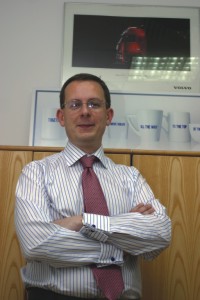 Then and now
Then and now
Volvo trucks have been sold locally since 1990 and the firm has now branched out into setting up its own office, offering on the market new and used trucks, aftermarket services and leasing operations. In 2003 Volvo Trucks Corporation created a local branch, called Volvo Romania, through acquiring Autocamioane, the company's local representative since 1990. In the first nine months of this year, it sold 570 new and 147 used trucks.
Greatest achievement
To raise the standards of organising the Romanian branch to that of any western European Volvo Trucks centre, says Cedric Bouan, managing director of Volvo Romania.
Greatest challenge
Maintaining the relationship with the company's business customers, says Bouan. The fact that Romania is not yet part of the EU makes things a bit more difficult when it comes to formalities connected to truck imports from Sweden and Belgium-based Volvo truck assembly factories.
Infopress
Then and now
Full service printing house Infopress now forecasts a 34 million Euro turnover for 2005, around 8.5 million more then 2004.
Greatest achievement
“Becoming the leader in printing the Romanian high circulation colour magazines and retail brochures market,” says Albert Andras, the firm's general manager, and also “an important player in south-eastern Europe, with an important portfolio of clients: multinational publishing houses, media trusts, advertising agencies and supermarket chains, that represent our internal and external customers.”
Greatest challenge
“Redirecting our company in 1993 to a higher quality and bigger capacity production after three years of newspaper-printing and leaflets,” says Andras. In order to meet this target, Infopress managed to attract foreign investors and had implemented for the first time in the Romanian printing field an up-to-date technology with an eight-page web press.
UTI
Then and now
It started with 5,000 old lei in 1990 when founder Tiberiu Urdareanu bought a few laptops from a local kiosk and sold them on, at 300,000 lei, to Bucharest University, when professors still received foreign financing for such endowments. Then in 1992 Udareanu's UTI branched out into security systems and now employs 3,700 people, with a 60 million Euro turnover and an international presence.
Greatest achievement
Continuous growth. “Each year we increase our turnover by 30 per cent,”
says Urdareanu.
Greatest challenge
Security systems for nuclear power plant Cernavoda, which was the firm's biggest contract to date.
J'Info Tours
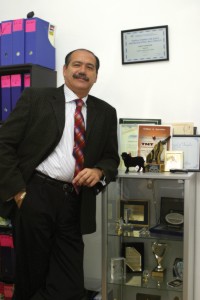 Then and now
Then and now
A private endeavour of local businessman Aurel Pavel, J'Info Tours constantly ranks among the country's top tour operators, says the general manager. J'Info has had an annual growth rate of up to 30 per cent and this year's turnover will approach 16 million Euro. The J in J'Info stands for Pavel's daughter, Jacqueline.
Greatest achievement
J'Info's affiliation to BTI, one of the world's top three travel management companies.
Greatest challenge
Pavel sees an inconsistent strategy from most tour operators and a lack of good management techniques in the local tourism industry as the largest impediments a company like his has to developing on the Romanian market. “Above all there is the very 'unfriendly' legislation and the banks' incredibly high interest rates should one want to get a business loan,” says Pavel. “Anyone who wants to develop needs to invest and they cannot do that unless there are fair conditions for all.”
10 YEARS
Hertz
Then and now
Hertz's franchisee, AAA Autorent, has managed to move from a disastrous beginning in the first three years to maintaining the top position in car rental companies, says managing director Jean-Alain Grumbach. When he took over in 1998, he says the fleet was in a bad shape, it had accumulated outstanding debts, had untrained personnel and “the cash flow was catastrophic. In any normal country such a company would not have survived.” Since then, Grumbach says: “We had a successful turnaround, continuously expanded and managed to put the company on a solid base, from the financial and managerial point of view.” Now Grumbach employs 49 people and forecasts a turnover of about three million Euro.
Greatest achievement
Grumbach says Hertz climbed up to first place from third in one year since the turnaround and remained there ever since. He says the rent-a-car business in Romania “moves more or less parallel” with the hotel business. “We're talking more about business rentals than leisure rentals, as leisure tourism in Romania is not going that well,” he says.
Greatest challenge
Grumbach says the biggest impediment was staff mentality. “I built up a small team and I started cleaning up the company,” he says. “We had fixed goals and ways to reach them, we made people understand they are in a service industry, and, above all, we had to explain the word 'service', what it means and how to make it work, so that in the end we became visible as a company that offers good quality services.”
Electrolux Romania
Then and now
In 1910 salesman Axel Wenner-Gren invented a 20 kg pump-and-engine contraption to make a woman's life easier. This transformed into the washing machine and the company that built it developed into a firm with 55 million products sold each year in more than 150 countries. Locally, Electrolux has invested 19 million Euro in total, including purchasing a factory in Satu Mare, and enjoyed a turnover of 46 million Euro for the first half of this year.
Greatest achievement
“Acquiring the Satu Mare plant and the cooker production (a large part of Zanussi cookers for Europe is produced in Satu Mare), which is directed at both the local and international markets: the Baltic countries, Israel, Finland, Russia, Sweden and Norway,” Carmen Georgescu, marketing and communication manager at Electrolux Romania, tells The Diplomat.
Greatest challenge
People's mentality is the first thing Georgescu refers to. Brand communication was necessary. “That's why we have always emphasised direct marketing, an active PR department, staff training for the sales force and product demos. Now, major changes can be observed: people start to consider quality as more important, as well as design and functions over price,” says Georgescu.
Marsh
Then and now
Experts in risk evaluation for companies and insurance brokerage, Marsh opened in Romania in 1995 as one of the first international insurance brokers in the nation.
Greatest achievement
General manager Cristian Fugaciu says the company has been the top insurance broker since starting out, with a market share, at present, of around 20 per cent.
Greatest challenge
Marsh has dealt with the fact that Romanians lack an insurance-oriented mentality, so Fugaciu finds it is important to pay more attention to promoting insurance products.
ABN Amro
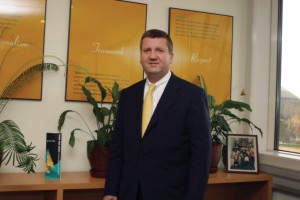 Then and now
Then and now
Dutch-based ABN Amro has been involved in stimulating international trade since 1824 and started operations in Romania in 1995 by launching corporate banking operations. Last year the bank entered the ever-challenging consumer race. “Over the past year in consumer banking, we leveraged it very nicely with the corporate focus, and it integrated very well in our local activities,” Peter Weiss, country executive and chairman of the board of ABN Amro Romania, tells The Diplomat.
Targeting the 'mass-affluent' niche, which includes entrepreneurs who have started their own businesses and look to grow, Weiss says competition is fairly strong in this particular segment. One of the initial contenders for Romania's largest bank, BCR, ABN Amro since withdrew from the race. “Instead we will focus on growing organically, and are not thinking at a takeover as of now,” says the country executive. “We will look at an opportunity to acquire a local bank if that bank fits with our strategy and culture, and is for sale at a reasonable price. Then we will certainly look at the opportunity.”
Looking at the top ten banks in Romania, Banca Transilvania is the only purely domestic bank whose assets would entice any foreign bank to look at it closely, he says. Employing 700 people, ABN Amro's plans for the next three months include opening three more branches in Bucharest, Constanta and Ploiesti, plus developing a call centre and Internet banking.
Greatest achievement
Weiss took over the reigns four months ago so, speaking from recent experience, he says: “We helped the city of Bucharest with its 500 million Euro bond issue, and we're also working together with BCR for its 300 million Euro bond issue.”
Greatest challenge
Handling growth, says Weiss, is the greatest challenge. "It is great to be part of a growth story, but we've seen enough examples in other economies of not being able to deal with growth. It is important for us to help clients manage this growth.”
Baumit
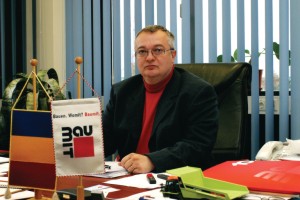 Then and now
Then and now
Part of international construction material concern Schmid Industrie Holding, Baumit has invested 15 million Euro in Romania and now employs about 120 people. This year Baumit opened a dry mortar plant in Teius, Alba county, modernised its dyeing and plasters plant in Bucharest and opened a new warehouse in Bacau. General manager Laurentiu Lupusor says: “The market is constantly growing to the point in which demand is bigger than what we can offer.
Greatest achievement
“Baumit Romania now has national coverage, and there is virtually no corner of this country where our products are not used,” says sales manager Rolland Mlenajek.
Greatest challenge
Mlenajek says one constant challenge is implementing the quality concept day-to-day. “We believe we have succeeded in educating the end-consumers towards being very strict when purchasing construction materials,” he says.
DC Communication
Then and now
Back in 1995 public relations was a strange concept for most local companies but, undeterred, Doru Frolu and Crenguta Rosu noticed that good press and communication skills was what many firms were calling out for, even if they did not realise this themselves. So they founded DC Communication (abbreviated after the first letters of their Christian names), a pioneering firm viewed by some as a local leader.
Greatest achievement
“We have succeeded initially by luck and later by policy to gather a team like no other (we think). Good professionals, oriented towards the job, open and determined to make things happen in the right manner,” says co-managing partner Crenguta Rosu.
Greatest challenge
“We could see how the demand was growing but also how there was confusion regarding the role and it was hard to communicate the usefulness of PR,” adds Rosu. The firm had to learn how to grow, organise itself and how to contain a larger team with a harmonised vision. “This involved reading a lot, learning a lot and working a lot,” she says.
5 YEARS
JW Marriott Bucharest Grand Hotel
Then and now
Following a 150 million Euro investment, Bucharest welcomed a 'city within the city' in the JW Marriott complex. Its accommodation, entertainment and business facilities stretch over 402 rooms and suites, six gourmet restaurants and 2,000 sqm of convention centre opposite the Parliament Building, using a giant 1980s structure with a 1990s design. JW Marriott Bucharest Grand Hotel employs 470 people, and Kurt Strohmayer, its general manager, tells The Diplomat the hotel is in the top four most profitable in its chain in continental Europe.
Greatest achievement
In October last year Bucharest Marriott Grand Hotel earned the luxury stamp of being the first JW Marriott brand in Europe. “This rewards excellence by definition, including an extraordinary building, outstanding performance on all levels and first-rate services and staff,” says Strohmayer. “The only detail missing is the new logo on top of the building, but that will be solved by the end of the year.”
Greatest challenge
“Other than being overbooked quite often?” Strohmayer replies. “Seriously, Bucharest misses a real development of what's called 'weekend tourism'. Cities such as Prague, Budapest and Moscow are quite developed from this point of view.”
World Class Health Academy
Then and now
“We have built our client base from ground zero to nearly 1,400 members at The Grand, next to the JW Marriott,” says Michelle Dietrich, general manager of fitness centre World Class Health Academy. “With our second centre in Bucharest on Calea Victoriei, we now service over 2,500 members. Additionally, we hold a high reputation and satisfaction rate as a top fitness and spa provider for guests of JW Marriott and Centreville Aparthotels.”
Greatest achievement
Moving from a single centre in Bucharest to another in the capital and to Constanta this year.
Greatest challenge
“Gaining the support of all the investors and partners was one of the first challenges,” says Dietrich. “We have evaluated the local market demand and comparable trends on the global market in order to gain support for the growth of our business. Employee development, especially in the area of customer service, is an ongoing process that heads the list of priorities for business success.”
Aviva Romania
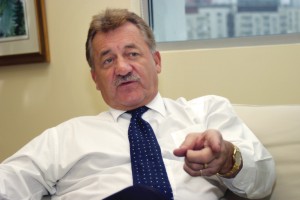 Then and now
Then and now
Commercial Union started its activity in Romania in 2000, before being bought out on a global scale by British-based Aviva in 2002. The company had already started its first bancassurance partnership with BRD and, in 2003, began another with ABN Amro. Last year, Aviva and Medicover also signed a partnership for Aviva's private health insurance products. Now the firm has a market share of five per cent, despite the fact that “there have been five tough years to grow a company,” Carl Boehr, President and CEO of Aviva Romania, tells The Diplomat.
Greatest achievement
Boehr says the partnerships with ABN Amro, BRD and Medicover are among its major successes.
Greatest challenge
“To create a culture of savings for the future,” he adds. “Life insurance is still relatively new to Romanians.” He adds that there is a need for “good salesmanship and education” to change the local mentality on seeing insurance as a vital part of life.
Cargo - Partner
Austrian freight forwarder Cargo-Partner has set up locally in 2000, offering aerial, maritime and road transport to companies in a wide range of fields, including IT, textile, automotive and aviation. Dutch-born branch manager Kees Cramer tells The Diplomat. “The Constanta harbour is our top priority. We expect it to become the Rotterdam of eastern Europe, and despite heavy bureaucracy and lack of transparency, it is amazing how well-known the port is abroad, especially in the Far East.”
Greatest achievement
“Our team,” says Cramer. “There are so many fairytales about how difficult it is to work with Romanians, but the truth is that success starts with people and we got the best out of our team.”
Greatest challenge
The unpredictability in legislation, especially in customs duties. “This country should just adopt EU legislation and have things clear once and for all,” says Cramer. “But things are on the way of becoming clearer.”
Toyota Romania
Then and now
In 2000, with only 100 cars sold, Toyota Romania's turnover was around 1.25 million Euro, with two people and about 250,000 Euro in losses. But last year saw it make a seven per cent profit and this year the aim for turnover is 68 million Euro, with 160 planned to be employed by 2006.
Greatest achievement
“We took a brand that was virtually unknown on the Romanian market and in four to five years have got to a level where only very few are unaware who Toyota is, what Toyota is doing and what is happening with Toyota all over the world,” general manager Stratos Vakkas, tells The Diplomat.
Greatest challenge
“At the beginning we had to learn how to work with Romania's bureaucracy,” says Vakkas. “Also finding the right employees.”
Total Business Solutions
Then and now
Set up five years ago as a business partner for companies wishing to excel on the Romanian market, entirely women-run HR firm Total Business Solutions started with only 20 clients and now provides services for 174. Since 2000, it has launched on the market executive search, HR Audit, Psychological ability tests, training and career management.
Greatest achievement
“The words that characterise our business: professionalism, efficiency, and confidence,” general manager Daniela Necefor tells The Diplomat. “The number of clients who are coming to us is increasing. Many new firms, interested in starting a business here in Romania, trust us very much and prefer working with us.”
Greatest challenge
“We continually prove ourselves as a good and strong competitor on the HR market,” says Necefor. “We did have to face competition with companies established on the Romanian market in the fields for ten years and we won. This and the fact that a team of women is using their intuition and their professionalism to keep up with the pace of the market's development.”
Finansbank
Then and now
Finansbank Romania has seen its assets grow by 500 per cent, its employees from 287 to 1,039 and its number of the branches rise from ten to 37 since 2000. Now Finansbank Romania aims to reach a nationwide coverage of 100 service points by the end of 2007.
Greatest achievement
Launching joint credit and shopping card CardFinans Avantaj, says Tamer Ozatakul, president of Finansbank Romania.
Greatest challenge
Human resources, says Ozatakul, was the biggest challenge. “To overcome this, we implemented incentive programmes, evaluation schemes and a family atmosphere. We invested in the 'Human' because we believe in 'Loyalty',” adds the president.
Volksbank Leasing
Then and now
In 2000 VB Leasing Romania opened its office in Bucharest, with just seven employees. Now the firm is present nationwide and plans to open in Sibiu, Oradea and Galati, according to administrator Razvan Diaconescu. The firm has 80 employees nationwide and a portfolio of more than 18,000 contracts, worth more than 300 million Euro.
Greatest achievement
Volksbank Leasing International Group's objective worldwide is to be among the top five players in each of its local leasing industry, which it has achieved locally.
Greatest challenge
Competition. “After a short decrease of our business volume, which was absolutely normal considering that VB Leasing was the only real player on the Romanian leasing market until the end of 2002, we managed to get back on top,” says Diaconescu.
by Corina Mica, Ana-Maria Smadeanu and Anca Pol
 Then and now
Then and now Then and now
Then and now Then and now
Then and now Then and now
Then and now Then and now
Then and now Then and now
Then and now Then and now
Then and now Then and now
Then and now Then and now
Then and now